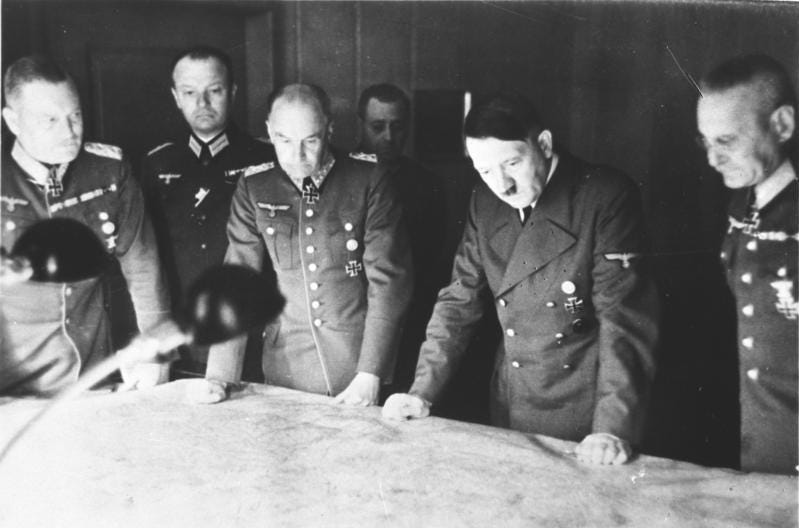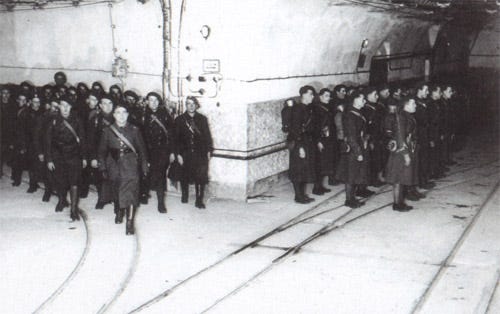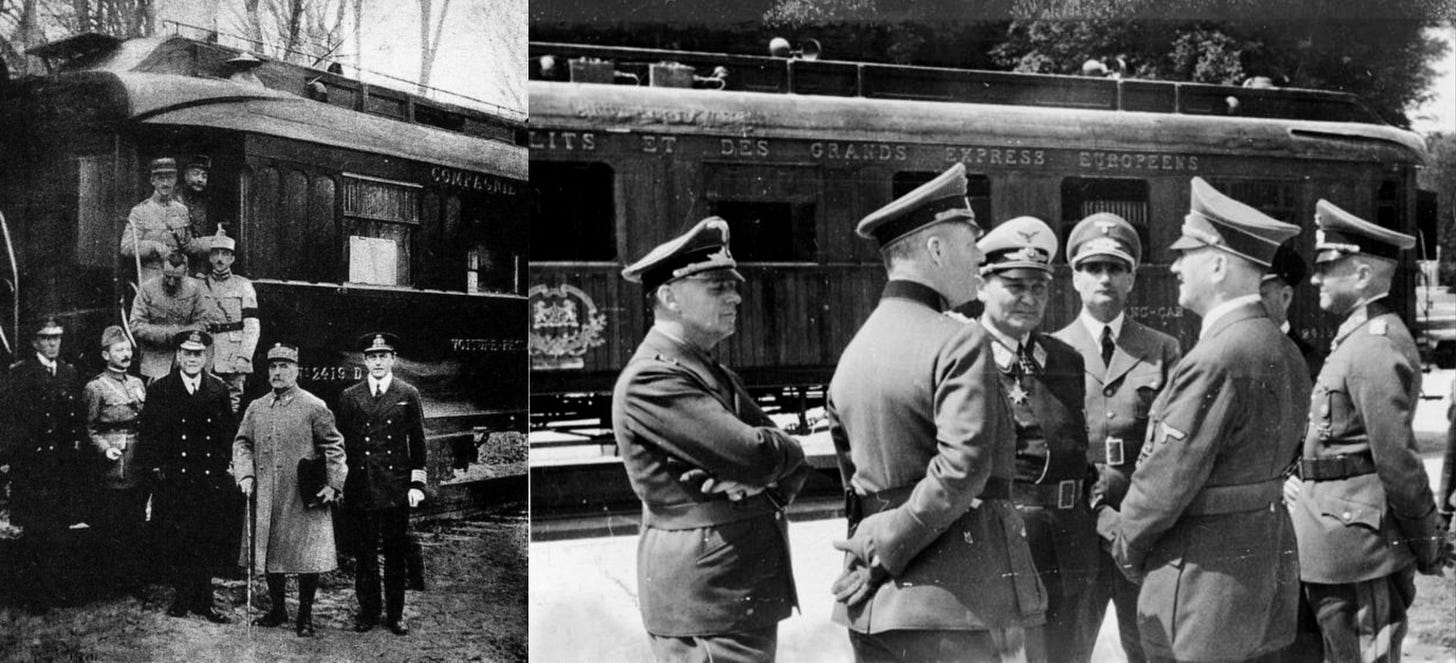
The term “blitzkrieg” is used to describe the German strategy for making war in the early years of World War II. Blitzkrieg – “lightning war” – entailed surprise, terror, and most of all unprecedented speed. From 1939 to 1941, the nations of Europe were defeated by this new German approach to war. Poland, Denmark, Norway, the low countries (the Netherlands, Belgium, and Luxembourg) and France – once a great power – collapsed with astonishing speed.
France spent many years and a fortune to prepare the Maginot Line, a chain of forts connected by underground tunnels on its border with Germany. The French were expecting World War II to be a replay of World War I. Therefore, they prepared for a static war. The German war of movement devastated them. From the time the Germans crossed the Meuse on May 13, 1940, to the signing of the armistice six weeks later, the French were outmanned, outgunned, and “out-thought.”

Germany’s conquest of France was one of the greatest victories in the history of warfare. The French collapse on the battlefield was not the whole story. The Germans demanded humiliation as well. Thus, the armistice was signed in the same railway car that France signed its armistice with Germany which ended in Germany’s defeat in November of 1918.

Since Trump’s inauguration on January 20, the new administration has launched its own blitzkrieg against law firms, universities, the media, and other American institutions concerning which Trump has cherished personal grudges. As of March 28, six law firms have been forced to come to terms with Trump, one way or another. The response of “Big Law” has been difficult to understand. Columbia University, which years ago declined to do a real estate deal with Trump, has been threatened with the loss of $400 million worth of federal funding. Similar to Big Law, America’s universities are simply waiting to be picked off one at a time.
As was the case with the Germans after the defeat of France in 1940, Trump’s goal is not merely to dominate, it is also to humiliate. While the panzers (i.e., tanks) of the Trump administration blitzkrieg have been gobbling up territory, his targets have been trying to hide behind a Maginot Line of their own. The targets are acting as if these are normal times which they most assuredly are not.
The heroes of the resistance to Trump’s aggression are celebrated all too briefly. You can read the story of Danielle Sassoon and of Denise Cheung in Chapters 31 and 32 respectively of this Substack series. These women should be held up as models for the whole country. Instead, their stories are forgotten in the midst of the publicity for whatever the daily outrage might be. Today’s headlines are about the attacks on various law firms and the assault on Columbia University. Who is next to be humiliated?
Resistance to Trump has taken the form of a World War I approach to a World War II environment. The United States needs Winston Churchill. Instead, it is stuck with Chuck Schumer.
In 1941, a German Jewish scholar and attorney named Ernst Fraenkel published a book entitled The Dual State.1 This remarkable volume is attracting a lot of attention these days because Fraenkel’s description of Nazi Germany appears to be the direction of the United States right now.
When the Nazis came to power in 1933, the legal landscape of Germany was altered. However, it was not totally obliterated. To the contrary, the legal environment was bifurcated. On the one hand, there was the “normative state.” This normative state did not entail a complete break with the past. Rather, it built upon the past.
The normative state was vital for capitalist economic activity to continue in Germany. Quoting Fraenkel: “The legal institutions essential to private capitalism, such as freedom of enterprise, sanctity of contracts, private property, the right of the entrepreneur to control labor, regulation of unfair competition, regulation of patent, trademark rights, etc., legal protection for interest agreements, property and transfer for purposes of security, still exist in Germany.”2
The capitalist cast of mind is oriented to the future. Planning for the future is not possible unless the rights enumerated above can be depended upon to persist indefinitely.
In addition to the normative state, the Nazis introduced what Fraenkel calls the “prerogative state.” Thus, the dual state: normative and prerogative. Fraenkel described the prerogative state as a “governmental system which exercises unlimited arbitrariness and violence unchecked by any legal guarantees. . . .”3 As University of Chicago Law School Professor Aziz Huq writes, in the prerogative state, “ordinary law” does not apply.4 Law is the prerogative of the king, or the dictator, or the President, or the President’s men.
Trump’s declaration that “He who saves his Country does not violate any Law”5 is an important signpost in the context of Fraenkel’s work. With this statement, Trump makes as blunt an assertion of the prerogative state as has ever been uttered by an American. Since he conceives of himself as the savior of his country (while obviously quite the opposite is the case), Trump says he cannot break a law. That is because the law is what he says it is.
Fraenkel’s discussion of normative versus prerogative law is critical for America today because we see the two forces clashing regularly. When Danielle Sassoon refused to drop the federal case against New York City Mayor Eric Adams because Trump’s man, Emil Bove, told her to do so, she represented normative law. Bove represented prerogative law. The same is true of Denise Cheung. She represented normative law as opposed to Ed Martin, Trump’s bully, who represented prerogative law.
Early in the dual society which was the Nazi dictatorship, normative law and prerogative law coexisted, albeit uneasily. Normative law lived in the business world. Prerogative law lived in the political world. Trouble arose when these two worlds collided. If a German Jewish business partner of a German gentile wanted to assert his legal rights, then he was face-to-face with an unsolvable dilemma. National Socialism was “unable to avoid the problem of legal stability versus political expediency.”6 In matters of “race,” prerogative law took the place of normative law even though prerogative law was bad for business.
As time passed, the realm of normative law receded in Nazi Germany; and the purview of prerogative law expanded. The result was destruction and death from 1939 to 1945 on a scale not witnessed up to that time. “[T]he Third Reich is a theocracy without a God,” Fraenkel explained. “The National-Socialist state seeks only its own glorification. But as a quasi-ecclesiastical institution, it views those who transgress against its rules not as criminals but as heretics.”7
The history of the interplay of normative and prerogative law in Nazi Germany is a cautionary tale. There will be pressure from the prerogative law against the normative law in the United States also. The more victories the prerogative wins, the more victories there will be in the future. Nothing succeeds like success.
Trump began his assault on law firms by issuing an executive order aimed at Covington & Burling. That was followed by a similar order against Perkins Coie. The latter firm won a temporary restraining order from Judge Beryl Howell. Unsurprisingly, the government (the prerogative state) tried, unsuccessfully, to have Judge Howell (the normative state) removed from the case. Next came an executive order targeting Paul, Weiss. That firm caved, to the surprise of many. The firm has transitioned from normative to a tool of the prerogative. Unsurprisingly, Jenner & Block was targeted next on March 25. The more firms that cave, the more such attacks there will be.
Professor Huq of the University of Chicago understands the insidious nature of the dual state. As he puts it: The nation’s CEOs “can look forward to the courts being open for the ordinary business of capitalism. So, too, can many citizens who pay little attention to politics expect to be unscarred by the prerogative state. The normal criminal-justice system, if only in nonpolitical cases, will crank on. Outside the American prerogative state, much will remain as it was. The normative state is too valuable to wholly dismantle. . . .”8
No one should be reassured by these observations. “The peril of the dual state,” Professor Huq explains, “lies precisely in its capacity for targeted suppression. Most people can ignore the construction of the prerogative state . . . because it does not touch their lives. They can turn away while dissidents and scapegoats lose their political liberty. But once the prerogative state is built, as Fraenkel’s writing and experience suggest, it can swallow anyone.”9
Big law and tier one universities are facing German panzers. The Maginot Line will not serve them well.
Let us take a brief look at another contribution which Fraenkel’s remarkable book makes.
Joyce Vance is a well-known attorney who publishes an outstanding column on Substack. On March 26, her headline was: “What Will It Take?”10 She asked: “Why doesn't any of this break through? Why do Republicans still support Trump? The reporting in The Atlantic on the Signal chain? The voter suppression executive order Trump issued yesterday? The foul-ups in deporting supposed gang members who turn out not to be? Why aren’t Americans out on the streets protesting in massive numbers. . . ?”
Her answer to her question is:
“In part, it’s because a large number of people who are Trump supporters just don’t care. Their guy can do anything, and they don’t care. They’ll believe any lie, and they’ll ignore any horrible [reality]; they’re all in for Trump for reasons the rest of us still struggle to understand.”
Ernst Fraenkel lived from 1933 to 1938 in the belly of the beast that was Nazism. His escape was little short of miraculous. He had occasion to ask his own version of Vance’s question: Why was what was happening in Germany happening?
His discussion of this issue is subtle and involved. However, there is one passage which demands to be taken seriously right now not only as a response to the craziness of Nazism but also as a clue to the nature of the powerful bond that keeps Trump’s supporters attached to him. We know that some of his people like him because they believe he will make them richer. Bezos, Zuckerberg, and Musk are only the most obvious examples. Others support him because they are opposed to abortion, and that is the most important political issue in their view. Overturning Roe v. Wade is one of the few promises that Trump has kept. For a third group, support for Trump is not rational. It is to understand this group that Fraenkel offers an intriguing observation.
Fraenkel reports an observation of a man he describes as “an intelligent young National-Socialist” named Rainer Heyne. This person had recourse to a discussion of the nature of “myth”. He characterized “myth” as “irrational, and therefore irrefutable and absolutely safe from the attack of rational criticism.”11 This strikes a responsive chord. If this third group of Trump's supporters could be persuaded by rational argument, they would have been persuaded by now. But they believe in the myth that Trump created of himself through decades in the public eye and especially during his years as a television star.
We are living through the clash between a charismatic myth and reason. The formula for working our way out of this situation is not apparent.
Oxford: Oxford University Press, 2017.
Fraenkel, State, p. 73.
Fraenkel, State, loc. 322.
Aziz Huq, “America Is Watching the Rise of a Dual State,” The Atlantic, May, 2025.
https://www.nytimes.com/2025/02/15/us/politics/trump-saves-country-quote.html
Fraenkel, State, p. 74.
Fraenkel, State, p. 49.
Huq, “Dual.”
Huq, “Dual.”
Fraenkel, State, p. 207.






Richard, thanks again for providing historical context in a clear and persuasive way.